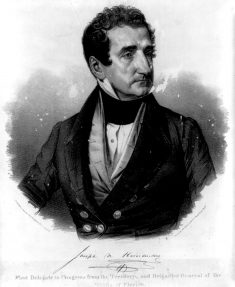| Joseph Marion Hernandez | |
|---|---|
 |
|
| Career | Politician, Military |
| Born | 1788 |
| Died | 1857 |
| Nationality | Hispanic American |
The life of Joseph Marion Hernandez: the hand of a successful plantation developer, the voice of a passionate politician, and the heart of a determined soldier. The evolution of his personal story is an exciting turn of events that led him across various life interests and ambitions.
Family Background
Joseph Marion Hernandez was of Hispanic origin born in St. Augustine, Florida which at the time was Spanish Territory. His immigrant parents settled in the northern part of Florida, which was delineated as the quarter for Minorcan. They gave birth to 10 children, including Joseph.
The Hernandez family, although not being part of the elites of St. Augustine, had some substantial wealth that enabled them to acquire slaves and to educate Joseph in Catholic schools.
Early Career
In 1814, he married Ana Hill Williams, a wealthy widow in St. Augustine, who owned massive properties such as the 3,200-acre Orange Grove which was a sugar cane plantation. With these new resources, Joseph entered the plantation industry where he acquired more lands during the Patriot War.
After the First Seminole War in 1817, Joseph received service grants from the Spanish Government where he acquired even more lands. During the US annexation, it was recorded that he had more than 25,000 acres under his control. Among which, he managed three successful and renowned plantations: San Jose, Mala Compara, and Bella Vista (currently Washington Oaks State Gardens).
Political Interest
He developed a deep interest in the world of politics and in 1822, the Florida legislative council appointed Joseph as the First Territorial Delegate from the Florida Territory. Shortly after, in 1823, he was appointed to the House where he was known as the first Hispanic Congress Representative. He had qualities that were necessary and advantageous for the position at the time of Florida’s Spanish-US Transition such as being bilingual, an experienced agriculturist, and a soldier of two major wars.
Later, he lost in the 18th congress in 1823, as well as in the 19th congress in 1825. He remained as the presiding officer of the Territorial House of Representatives from 1824 to 1825. He stayed active in politics while continuing to run his plantations. Unfortunately, the 16 plantations, including the sugar-cane plantation, were ruined and burned by the Seminoles during the Second Seminole War in East Florida.
Time in the Service
He was appointed as Brigadier General over companies of militia and regular troops to the Seminole Camp where they managed to capture prominent Seminole leaders, including Osceola. He later asked to be relieved of his duty to minimize the wars’ impact on his wealth.
He attempted to make a come back to his political career by running for the U.S. Senate in 1845, however, Joseph was unsuccessful as a Whig candidate.
Retirement
Joseph Hernandez, upon accepting defeat from his political competitors, still managed to continue in local politics as the mayor of St. Augustine in 1848. He then moved to Cuba where he returned to his plantation business in the Coliseo District. He died at the family’s sugar estate.